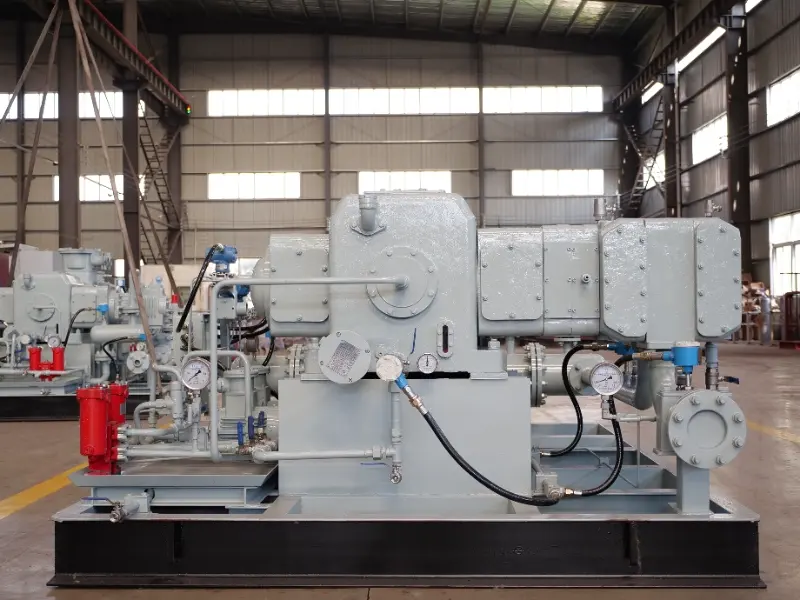As global demand for clean energy continues to rise, hydrogen, as a sustainable and low-emission energy carrier, is gaining increasing attention. In applications such as hydrogen fuel cells, energy storage systems, and industrial processes, efficient hydrogen compression technology plays a crucial role. However, hydrogen compressors differ significantly from traditional standard air compressors due to the unique properties of hydrogen and its specific application requirements. This article explores the differences between hydrogen compressors and standard air compressors and discusses the future challenges of hydrogen compression technology.

Unique Properties of Hydrogen and the Challenges for Compressor Design
Hydrogen gas molecules are extremely small, with a high volume-to-pressure ratio, requiring efficient compression for storage and transport. These properties pose several challenges for compressor design. Compared to standard air compressors, hydrogen’s physical characteristics demand more precise sealing, higher compression capabilities, and a design that ensures oil-free operation.
- Molecular Size of Hydrogen: Hydrogen molecules are much smaller than nitrogen and oxygen molecules in air, making them more prone to leakage. Standard air compressors, which are not designed with this feature in mind, cannot effectively control hydrogen leakage.
- High-Pressure Requirements: Hydrogen often needs to be compressed to very high pressures (such as over 700 bar) for storage and transport, which demands greater pressure capabilities from compressors.
- Purity Requirements: Hydrogen’s high purity requirement often necessitates oil-free operation, which imposes stricter demands on the compressor’s lubrication and sealing systems.
Key Differences Between Hydrogen Compressors and Standard Air Compressors
1. Advanced Sealing Technology
Due to hydrogen’s tendency to permeate more easily than nitrogen and oxygen, hydrogen compressors must incorporate advanced sealing technologies. Special sealing materials are used to prevent hydrogen leakage, ensuring both safety and efficiency. The sealing technology in standard air compressors is inadequate for controlling hydrogen and leads to potential leakage risks.
2. High-Pressure Capacity
Hydrogen’s applications, such as in fuel cells and energy storage systems, require it to be compressed to high pressures. Hydrogen compressors are designed to withstand pressures exceeding 700 bar (10,000 psi), far beyond the pressure range of standard air compressors. Multi-stage compression technology is widely used in hydrogen compressors, where each stage is meticulously designed to ensure system stability and safety as pressure increases.
3. Oil-Free Operation
To maintain hydrogen’s purity, oil-Free hydrogen compressors typically employ dry compression technology that avoids using oil-based lubricants. This prevents contamination of the hydrogen gas. A common type of hydrogen compressor is the diaphragm compressor, which compresses gas using a flexible diaphragm, thus eliminating the need for oil-based seals and ensuring the hydrogen remains oil-free.
The Future of Hydrogen Compressor Technology and Challenges
As hydrogen continues to emerge as a clean energy source, the development and innovation of hydrogen compressor technology will play a key role in driving the hydrogen industry forward. Future challenges and directions for hydrogen compressor technology include:
- Increasing Compression Efficiency: Improving compressor efficiency and reducing energy consumption will be a key focus for future technological advancements.
- Cost Reduction: Reducing the manufacturing and maintenance costs of hydrogen compressors will help promote the wider adoption of hydrogen energy.
- Long-Term Stability: Ensuring long-term stability and safety of hydrogen compressors operating under high pressure is critical for future technological improvements.
Contact Us for More Hydrogen Compressor Solutions
With the global expansion of hydrogen applications, advancements in hydrogen compression technology will bring new opportunities across various industries. If you have any questions or requirements regarding hydrogen compressors, feel free to contact us. Kehai provide expert technical support and solutions to help you achieve efficient and safe hydrogen compression.
Whether in hydrogen fuel cells, hydrogen energy storage systems, or other hydrogen applications, we offer tailored compressor solutions to support the sustainable development of hydrogen energy.
Contact us now to explore the hydrogen compression technology best suited to your needs and help drive the future of hydrogen energy!
